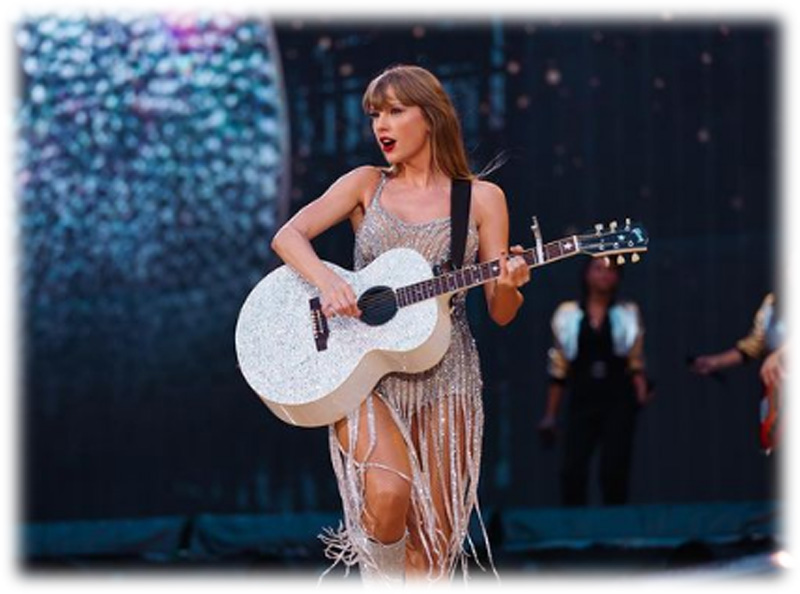
TikTok removes Taylor Swift, The Weeknd, others after licensing agreement with Universal Music fails
TikTok has removed music from artists like Taylor Swift, The Weeknd, and Olivia Rodrigo following a dispute with their record label, Universal Music Group (UMG), media reports said.
The licensing agreement between TikTok and UMG expired Wednesday, and the two parties could not reach a new deal, BBC reported.
UMG claimed that TikTok wanted to pay a much lower rate compared to other social media platforms for access to its music, while TikTok accused UMG of promoting a "false narrative and rhetoric," according to the BBC report.
Videos featuring UMG music will now be muted, and new videos cannot be created with those specific tracks.
It is worth noting that artists such as Ariana Grande and Katy Perry have seen most of their music removed from their official pages, with only a few songs remaining from other labels.
Billie Eilish, also a UMG artist, has had all but one of her songs taken down, as her song "What Was I Made For?" was featured in a Barbie movie whose soundtrack was released by Warner Music Group, the report said.
Sophie Ellis-Bextor's viral hit "Murder on the Dancefloor," featured in the film Saltburn, is also no longer available.
However, unofficial, sped-up, and slowed-down versions of the tracks are still accessible for use on the platform.
Noah Kahan, whose chart-topping song "Stick Season" initially gained popularity as a viral TikTok clip, shared a video on his TikTok account expressing his inability to promote his latest song on the platform.
"I can't stick it down your throats anymore on this app," he was quoted as saying by BBC.
"I'll probably be OK, right? I'll land on my feet, right?"
Cody Fry, an artist signed to a record label under UMG ownership, said in a TikTok video that he felt caught in the middle of a conflict, likening it to standing between two colliding planets.
He became aware of the situation when reports surfaced about the expiration of the licensing agreement, just as one of his tracks gained popularity in China.
Despite the viral success of his song "I Hear A Symphony" on TikTok in 2021, several years after its initial release, the 33-year-old musician revealed to the BBC that he didn't even have a TikTok account at the time.
He added that he thought TikTok should "value music more than it does currently" and he hoped the two big shots could have fixed their differences without "leaving it to the expense of artists on the ground".
"I don't know much about the mechanics of these massive corporate negotiations," he said, "but I'd be remiss if I didn't express the frustration about how this was handled on behalf of myself, and I think Universal's artists, because to find out something like this on the news, it's pretty tough."
Streaming and social media platforms generate royalty payments for music companies and artists when their songs are featured in videos. On TikTok, these songs serve as background music for the content uploaded to the platform, said the report.
However, concerns have persisted regarding the relatively low compensation provided by these platforms.
In the current situation, this unease has spiralled into a significant and widely publicized disagreement.
Universal Music Group (UMG) and TikTok engaged in negotiations for a new agreement, but unfortunately, they were unable to reach a consensus before the deadline of January 31.
The impasse has led to the removal of music by prominent artists, such as Taylor Swift, The Weeknd, and Olivia Rodrigo, from the platform, affecting the ability of creators to use these tracks in their videos.
In an open letter, published on 30 January, Universal claimed that "ultimately TikTok is trying to build a music-based business, without paying fair value for the music".
Universal said it was also concerned about getting artists fair compensation for AI-generated songs made to sound like real artists - such as one made to sound like Drake and The Weeknd which went viral.
Universal also had issues with TikTok's content moderation, saying it failed to adequately deal with "the tidal wave of hate speech, bigotry, bullying and harassment on the platform".
According to the BBC report, TikTok said: "It is sad and disappointing that Universal Music Group has put their own greed above the interests of their artists and songwriters.
"Despite Universal's false narrative and rhetoric, the fact is they have chosen to walk away from the powerful support of a platform with well over a billion users that serves as a free promotional and discovery vehicle for their talent," it added.
Universal's competitor Warner Music agreed a licensing contract with TikTok in July 2023.
Support Our Journalism
We cannot do without you.. your contribution supports unbiased journalism
IBNS is not driven by any ism- not wokeism, not racism, not skewed secularism, not hyper right-wing or left liberal ideals, nor by any hardline religious beliefs or hyper nationalism. We want to serve you good old objective news, as they are. We do not judge or preach. We let people decide for themselves. We only try to present factual and well-sourced news.






